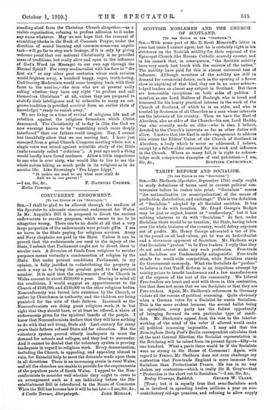CONCURRENT ENDOWMENT.
[To THE EDITOR OF THE " SPECTATOR.") SIR,—I shall be glad to be allowed through the medium of the Spectator to advocate concurrent endowment for Wales. In Mr. Asquith's Bill it is proposed to divert the ancient endowments to secular purposes, which seems to me to be altogether wrong. There can be no doubt at all that a very large proportion of the endowments were private gifts. I see no harm in the State paying for religious services. Army and Navy chaplains are paid by the State. Unless it can be proved that the endowments are used to the injury of the State, I submit that Parliament ought not to divert them to secular uses. A diversion of funds from religious to secular purposes means virtually a condemnation of religion by the _State. But under present conditions Parliament, in my opinion, is fully justified in redistributing the property in such a way as to bring the greatest good to the greatest number. It is said that the endowments of the Church in Wales amount to about £250,000 a year. Bearing in mind all the conditions, I would suggest an apportionment to the Church of £100,000, and £150,000 to the other religious bodies. Nonconformity was forced into existence by the Church, or rather by Churchmen in authority, and the children are being punished for the -acts of their fathers. Inasmuch as the Nonconformists are doing great religious work, it is but right that they should have, or at least be offered, a share of endowments given for the spiritual benefit of the people. I know that Nonconformists declare that they will have nothing to do with that evil thing, State aid. Last century for many years their fathers refused State aid for education. But the voluntary system proved utterly inadequate to meet the demand for schools and colleges, and they had to surrender. And it cannot be denied that the voluntary system is proving inadequate in regard to religious work. Every denomination, including the Church, is appealing, and appealing almost in vain, for financial help to meet the demands made upon them in all directions. There is an increasing strain in rural Wales, and all the churches are unable to provide for the requirements of the populous parts of South Wales. I appeal to the Non- conformists to consider well whether they ought to come to an arrangement such as I am indicating before the Dia- establishment Bill is introduced in the House of Commons. When the Bill has become law it will be too late.—I am, Sir, &c.,


























































 Previous page
Previous page